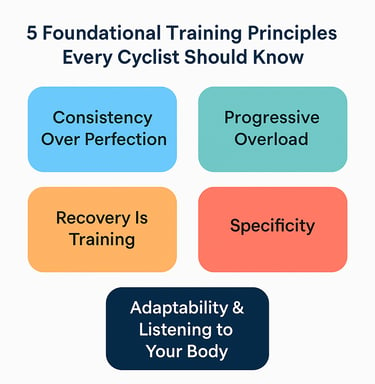Train Smarter, Ride Stronger: 5 Key Principles of Cycling Training
TRAINING
7/28/2025


1.Consistency Over Perfection
When it comes to cycling training, consistency beats perfection. Regular, steady training sessions allow your body to adapt and build endurance over time. Instead of attempting sporadic all-out efforts that can lead to burnout or injury, aim for a consistent schedule that fits into your lifestyle. Try setting aside specific days for cycling and treat these training sessions as unmissable appointments. Consistency helps your body get used to the effort, making each ride become part of your routine.
Remember: “It’s not what you do once, it’s what you do every week.”
2.Progressive Overload
To continually improve your cycling performance, you must incorporate the principle of progressive overload. This means gradually increasing the intensity, volume and duration of your workouts. For instance, you can enhance your cycling routine by slowly increasing your distance each week, introducing more challenging routes into your training or increasing your average speed on the rides. One tip is to spike your intensity every few weeks — add in a sprint interval or tackle a few extra hills — to keep your body and mind adapting to new challenges.But, do not increase the volume and intensity too fast, this can cause injuries or even a burnout.
3.Recovery is Training
Many cyclists overlook the fundamental principle that recovery is a crucial part of training. It's crucial to understand that the real improvements happen during recovery periods, not during the workouts themselves. Proper rest and sleep helps repair muscles, allowing for greater gains.Additionally it refreshes your mind, making it much easier to focus fully on your goal.Consider scheduling rest days into your routine just as you would your training days. Techniques like stretching, foam rolling, and even yoga can also help to enhance recovery, ensuring that when you hit the road again, you're recharged and ready to chase your goal.
Want to recover faster and feel better? Discover expert recovery tips here:
https://aestheticycling.com/top-recovery-tips-for-cyclists
4.Specificity
Cycling is diverse, and your training should reflect the specificity of your goals. Whether you're training for hill climbs, criterium races or long-distance rides, it's important to tailor your workouts based on your goal. If your goal is to be outstanding on climbs, incorporate more hills in your rides. To develop speed for races, include interval training to work on your power output. By planning sessions with your goals in mind, you’ll better prepare your body and mind for the specific demands that you’ll face on race day.
5.Adaptability & Listening to Your Body
Life can be unpredictable, and your training plan should align with that. Being adaptable means being aware of how your body feels and adjusting your schedule without feeling guilty. If you’re feeling fatigued or battling an illness, take a step back and modify your workout. For example, you could switch from a high-intensity cycle to a moderate ride or additional rest days. Learning to listen to your body not only helps in preventing injuries but also enhances your overall cycling journey.
If you’re not seeing progress, chances are one of these five pillars is off balance.


Socials
© 2025. All rights reserved.
